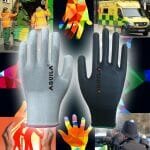~ WEG power for super green marine dredger ~
As major contributors to transport emissions, ship manufacturers are under increasing pressure to improve the efficiency of their vessels. Combined with heightened regulations and complex marine specifications, building and designing for a large vessel is a complex task. Electric motor manufacturer, WEG, experienced this first-hand when tasked with equipping a 15,000 m³ marine dredger vessel, Bonny River, with a complete set of generators and electric motors.
The latest design of the trailing suction hopper dredger (TSHD) Bonny River, which was built by Royal IHC, needed to be optimised for efficiency and energy consumption. In fact, Royal IHC, a supplier of vessels for offshore, dredging and mining markets, set out ambitions for Bonny River to be awarded ‘Green Passport’ and ‘Clean Design’ notation – a voluntary compliance for vessels which adhere to pollution prevention measures beyond the normal standard.
Environmental goals aside, designing and building a large dredging vessel is a complex task. Obtaining all the necessary equipment relies on a large number of suppliers delivering all components to IHC, who had overall design, build and integrator responsibility.
Winning designs
The competitive tender for the supply of power generators and electric motors was won by WEG for several reasons, not least because WEG could deliver all the generators and electric motors from a single source, therefore simplifying the supply chain.
In addition, WEG was able to offer custom-designed products for the vessel. Having been engineered by the experts at WEG, the motors and generators provided would not only meet the latest marine specifications, but also match with the systems delivered by IHC to ensure that the total harmonic distortion (THD) was kept to an absolute minimum.
The generators, from WEG’s water-cooled S-line and air-cooled AG10 line, now provide the power for both the main and the auxiliary systems on Bonny River, which is now in use by Belgium-based dredging organisation, DEME. The water-cooled M-line IC86W, the water jacket-cooled WGM20 IC71W and the air-cooled W22 line also all feature in various systems.
Integrated solutions for marine applications
WEG has the full solution in electric motors and alternators for the marine market. In addition to state-of-the-art products and services, WEG supplies reliable solutions with electrical machines to handle, maintain and supply services onboard.
Supplying for marine requires specific expertise, due to the often-unusual operations of a maritime vessel. The dredger, for instance, was designed to operate in depths up to 100 metres and in environmentally sensitive areas. Its dynamic positioning (DP2) system uses tunnel thrusters in combination with global positioning systems to hold a precise location, allowing the vessel to operate close to subsea structures.
The bow and stern thrusters on the vessel are also powered by WEG motors, as is the booster pump which discharges the sand and water mix either through a shore connection or by rainbowing directly onto an unloading site. The vessel uses a closed loop dredging process that minimises turbidity in the water, which is very important in environmentally sensitive areas.
As part of the design process, WEG provided IHC with the projected dimensions and weights of the generators and motors so that they could be positioned in the 3D model. This allowed the design team to check the fit of components as well as the balance of the vessel.
Optimum efficiency
As part of the energy reduction concept, WEG’s generators are able to run at variable speeds. This allows the engines to run at different speeds, depending on the operational status of the vessel. The specification called for the generators to deliver between 50 and 60 Hz, depending on engine speed, which ensures the engines are operated at optimum efficiency.
The system designed and delivered by IHC uses variable frequency drives (VFDs) and active front-end (AFE) technology which also helps to actively reduce harmonic distortion. As part of the design process, WEG completed all necessary calculations to ensure that specific values of transient and sub-transitory synchronous reactance met specific values, which were set by Bureau Veritas, an international testing and certification agency.
Both the variable frequency requirements and the THD characteristics are influenced by the generators’ stator coil design, which had to be engineered specifically for this application. Aside from the challenging marine environment, the additional requirements for improved efficiency would determine the impregnation process that was used to create the coil insulation system.
WEG power for super green dredger
Since the project’s completion, the marine dredger has been deployed by DEME. Having achieved its planned ‘Green Passport’ and ‘Clean Design’ notation, the vessel has already been mobilised in Flushing, Netherlands and embarked on its first dredging assignment.
The fact that so many components came from one manufacturer will have significantly reduce the complexity of maintenance for the vessel’s owners, DEME. In addition, WEG has provided a considerable amount of detailed information on the maintenance items so that the onboard maintenance team can source the necessary parts from WEG’s global network wherever in the world they are operating.
WEG’s involvement in this project allowed Royal IHC to meet its efficiency goals, by supplying a bespoke line-up of appropriate power generators and motors, uniquely selected for a maritime environment. More information on WEG’s solutions for the marine industry can be downloaded on the WEG website.
To speak to WEG directly, find your local distributor at www.weg.net.






